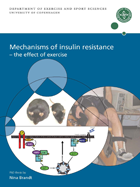PhD defence: Mechanisms of insulin resistance – the effect of exercise
Nina Brandt
PhD thesis
 Due to a sedentary lifestyle, the prevalence of Type 2 Diabetes (T2D) is increasing at alarming rates worldwide. Insulin resistance, defined as decreased ability of insulin to regulate metabolism in multiple target organs including skeletal muscle, is an early and key event in the development of T2D and a major factor in development insulin resistance is an oversupply of energy and lipid.
Due to a sedentary lifestyle, the prevalence of Type 2 Diabetes (T2D) is increasing at alarming rates worldwide. Insulin resistance, defined as decreased ability of insulin to regulate metabolism in multiple target organs including skeletal muscle, is an early and key event in the development of T2D and a major factor in development insulin resistance is an oversupply of energy and lipid.
This PhD thesis has addressed the mechanisms linking an oversupply of energy and lipid to development of insulin resistance in skeletal muscle and the mechanisms by which acute and chronic exercise ameliorates insulin resistance.
Findings presented in this thesis support the recent observations that the proximal part of the insulin signaling cascade may not be a key target in energy/lipid induced insulin resistance.
A novel observation was a lipid induced site specific impairment of TBC1D4 Ser341 phosphorylation indicating that the major mechanism by which lipids induce insulin resistance may well be downstream of Akt at the level of TBC1D4, further distal in the signaling cascade or within a parallel pathway that remains to be defined. Both a single bout of exercise and exercise training ameliorated insulin resistance in skeletal muscle without any alterations in proximal insulin signaling.
A single bout of exercise was found to be associated with increased site specific phosphorylation of TBC1D4 at multiple sites, confirming previous findings while no apparent enhancement in insulin signaling could explain the beneficial effect of exercise training on insulin stimulated glucose uptake in rat skeletal muscle.
Furthermore, the thesis has addressed the potential role for leukemia inhibitory factor (LIF) in initiating an alternative signaling pathway towards increased glucose transport in isolated mouse skeletal muscle and explored the option of bypassing insulin resistance in skeletal muscle via gp130 receptor signaling.
2011, 188 pages, DKR 100,-
ISBN: 978 87 917 7135 4
Time
Friday May 13, 2011 at 13.00 o'clock
Place
Auditorium 1, August Krogh building, Universitetsparken 13, Copenhagen
Opponents
Professor Ylva Hellsten (chair), Department of Exercise and Sport Sciences, University of Copenhagen, Denmark.
Professor Matthew Watt, Biology of Lipid Metabolism Group Department of Physiology, Monash University Clayton, Victoria, Australia.
Professor Mark A. Febbraio PhD, Head, Cellular & Molecular Metabolism Laboratory, Head of Basic Science, Division of Metabolism & Obesity, Baker IDI Heart and Diabetes Institute, Melbourne, Australia.
Supervisor
Professor Erik A. Richter, Department of Exercise and Sport Sciences, Faculty of Science, University of Copenhagen, Denmark.
